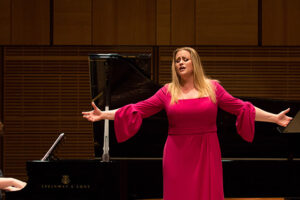

The reader further invited La Cieca to reflect on this concept of jishuku, or self-restraint, which seems to manifest itself at the moment as an attitude that in the current state of emergency in Japan, indulging in luxuries is considered distasteful and repugnant.
Now, what this has to do with opera is that reportedly the tickets for JapanArts’ presentation of the Met’s June tour to Japan (at a top of 64,000 Yen) are not selling well, despite superstar casting.
And now, a reflection from a rank-and-filer at the Met:
In the absence of any official announcements about how long the Met will wait and on what basis it will be making its decision, there has been plenty of speculation among company members about why the Met is so hesitant to cancel the tour. It seems highly improbable that it could feel confident about going in light of the State Department’s continued Travel Warning, numerous subsequent aftershocks of great strength—Thursday and another today, and the ongoing instability at Fukushima—remote, yes, but of concern nonetheless because of the general lack of data, misinformation, and conflicting reports on the levels of radiation down the line in the food chain and water supply further away from that area.
Many of us had come to the conclusion you mention: that the Met is looking to lose major dollars—and perhaps the goodwill of JapanArts—by being the one to cancel. But if the Met is waiting for JapanArts to cancel and the solo artists are waiting for the Met or JapanArts to cancel, the question I have is this: why, if JapanArts has been insisting all along that everything is back to normal in Tokyo (I have read many stories to the contrary), what would prompt JapanArts to cancel now?























Comments